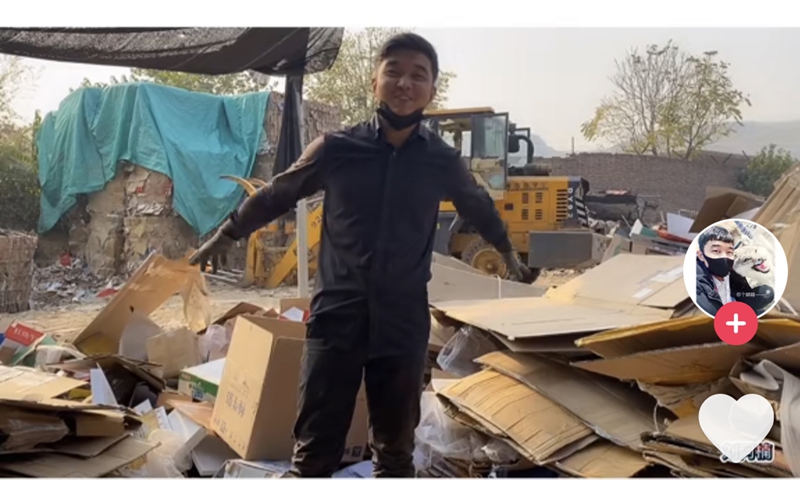New generation of waste recyclers go online to change stereotypes about the scrap industry
By Lin Xiaoyi Source: Global Times Published: 2020/11/17 22:39:55

Photo: screenshot of Douyin
Unlike most vloggers who emphasize beauty and aesthetics, Liu Anan (screen name) usually wears a mask in front of the camera. But he has no intentions of hiding his tough working conditions: a dilapidated factory filled with mountains of plastic and paper waste.
Liu owns a medium-sized scrap station in Handan of North China's Hebei Province, but has also become a web celebrity. Since he started posting his daily scrap-picking activities in 2019, he has gained 7.1 million followers on Douyin, China's domestic version of TikTok.
Under his Douyin account, comments like "Recycling is really cool, I'd like to work in a scrap yard too" are common.
According to a CCTV report, China produces more than 400 million tons of household garbage every year. But there is a small but important group struggling to help alleviate the pain of the "garbage siege."
At present, searching for the keyword "scrap" on Douyin finds more than 50 "web celebrities" who have more than 10,000 followers. More waste recyclers like Liu are creatively presenting their real work on the internet to change people's stereotypes of the recycling industry. Influenced by these content creators, more people realize that "waste is also precious," and recycling of waste materials is an important part of the circular economy.
Hard but happy work
"Recycling is a tough business, but it's fun," Liu told the Global Times.
Liu said his home was built on ruins as his parents and many relatives have also run scrap yards.
"I have been ridiculed as a garbage collector since I was a child. Although my heart has become numb, I hope that more people will put aside their contempt and realize that waste recyclers deal with waste and rubbish but they are not street rats," Liu said.
Liu noted that China's waste recycling industry chain has advanced quite a bit. "As long as you are not afraid of hardship, you can certainly make money," Liu remarked.
According to the Industry Development Report of Recycled Resources of China (2019) issued by China National Resources Recycling Association China recycled 322.82 billion tons of renewable resources in 2018, with a total value of 870.46 billion yuan ($132 billion).
Liu also stressed that the process of sorting waste is "full of surprises."
In the 1000-square-meter-scrap station, Liu picked up more than 70 watches, ranging in value from tens of dollars to several thousands of dollars. He's also picked up a pair of Chanel earrings and a Cartier bracelet. Up to now, Liu has collected more than seven hundred pounds of calligraphy and a thousand pounds of books.
"Just like the famous saying in the movie Forrest Gump, 'life is like a box of chocolates; you never know what you are going to get.' My videos allow many people to experience the positive energy that small surprises can bring to their lives, and also let them know that a lot of so-called garbage is actually precious and should have an extended life rather than be thrown away," Liu said.
Positive trends
On Liu's Douyin account, Liu labeled himself "CEO of Renewable Resources," as the daily work of the scrap station is to sort, cut and compress waste material like paper, steel, plastic and glass products, and sell them to renewable resource treatment plants for disinfection and fabrication so waste can finally be transformed into new products.
"As a 'transfer station' on the waste recycling production chain, the existence of each scrap yard is very meaningful," Liu commented.
Feng Yueyue, who has been dubbed as "Scrap Cinderella" by netizens on Douyin, also takes pride in her work.
"I started collecting when I was 16. At that time, I felt very upset when I saw other girls dressed up to go shopping while I was picking up garbage in the street. However, currently, environmental protection and the development of circular economy are increasingly advocated in our society. Running a recycling station is also a big undertaking," she told the Global Times.
In Feng's opinion, the further development of the circular economy should first realize the scientific classification of waste materials, which is the work that currently takes up most of her time.
"With the development of recycling industry, terminal manufacturers have higher requirements for waste recycling stations. For example, the classification of waste products is becoming more and more refined. The non-recyclable items will be sent to incineration or landfill. The recyclable ones need to be further carefully separated because of the different materials are treated and used in different way. To expand our business, we even need to learn some basic material chemistry knowledge," Feng said.
Therefore, Feng will shoot videos when she is free to teach netizens some simple ways to identify different types of garbage and advocate the correct classification of garbage.
"After watching these videos, I realized that collecting waste is also a skilled task," a netizen commented.
The internet has become a platform for Feng and netizens to communicate and learn from each other. "I once saw a netizen comment that she even dared not throw a toothpick away after watching my video as she thought it had recycling value, which made me very happy. At the same time, I also learned their hopes and new ideas for the recycling industry from their feedbacks," she said.
A few days ago, Feng opened a community service station for recycling, under netizen's proposal, in Lu'an in Anhui Province. Unlike some dirty, chaotic traditional scrap stations, Feng's storefront is clean, bright and tidy. Nearby residents who need to dispose of waste just need to simply place an order through WeChat and recycling staff will pick it up from their homes.
"Although it rained on the opening day, we received one and a half tons of waste. I'm sure better days are ahead!"Feng said.
Posted in: SOCIETY